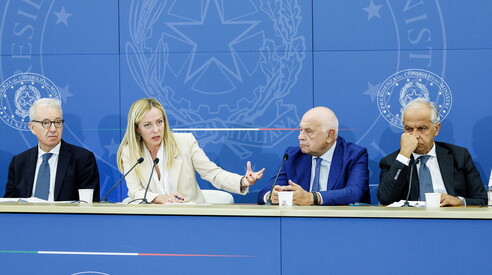Constitutional expert Curreri: "It's illegitimate for Bartolozzi to go to trial alone. The Chamber of Deputies must decide."


LaPresse
The interview
The Constitutional Law professor: "The Tribunal of Ministers focuses only on the role of government officials. This is wrong. The prosecutor's office should have also requested authorization from the head of the Justice Ministry's cabinet, as the law requires. If the government had invoked reasons of state, the matter would have been closed immediately."
On the same topic:
"There is one point in this entire Almasri affair that seems central to me, but has not yet been sufficiently clarified." What is it? "The Tribunal of Ministers is focusing only on the role of the ministers, Carlo Nordio and Matteo Piantedosi, and that of Undersecretary Alfredo Mantovano, while excluding Giusi Bartolozzi, who will be subject to a regular trial. Is all this legitimate? In my opinion, no," says Salvatore Curreri, a constitutionalist and professor at the University of Enna. Why? "The prosecutor's office, in my opinion, should have requested authorization to proceed against the head of the Justice Ministry's cabinet as well. The law," Curreri explains, "expressly states that the Chambers must also be able to assess the position of these individuals, who are fully involved, even if they are not members of the government." (Montenegro continues in insert II)
Professor, let's start from the beginning. What are your thoughts on the Almasri case? Is it, as the majority maintains, a case of prosecutors overreaching? "The magistrates are doing their job," Curreri begins. "Since the government raised the issue on a legal and formal level, it immediately seemed clear to me that this approach was open to potential criticism from the judiciary." Things would have been different, however, if Palazzo Chigi had asserted its decision at a political level from the beginning, when the International Criminal Court issued the arrest warrant for the Libyan torturer. " The government could have explained that it was a matter of national interest, involving so-called reasons of state, and could have even applied state secrecy. The matter would have been closed there, months ago."
That didn't happen, and paradoxically, after the summer, Parliament will have to decide, based on entirely political demands, whether to accept the request from the Tribunal of Ministers to proceed against Carlo Nordio, Matteo Piantedosi, and Alfredo Mantovano. Meanwhile, Prime Minister Giorgia Meloni's position, which called the situation "absurd," has been shelved . "It's true that political and legal responsibility are not the same thing. But," the professor points out, "in this case, it seems truly audacious to me to separate the two." Explain further. "A crime can also be committed by omission. The fact that Meloni didn't intervene doesn't mean she was unaware of it. She herself claimed responsibility for the decision. And besides, directing the government's political action is part of the role and duties assigned to the Prime Minister by the Constitution." Furthermore, Curreri's concern also stems from the fact that "the request is for Mantovano to be sent to trial, since he holds the Prime Minister's delegation for intelligence services. In short, the delegate is being investigated, not the delegator." This, according to the constitutionalist, is "the root of the problem" with respect to the action of the Tribunal of Ministers.
The second concerns the position of Bartolozzi, nicknamed the "Tsarina" of Via Arenula and a powerful figure through whom much of Nordio's ministry's activity passes. Her name appears in the magistrates' papers. "A person who, from what we read, is criminally implicated in the affair. But she's not part of the government; she's a department head, and for this reason the Prosecutor's Office apparently shouldn't have issued a request against her. So much so that the president of the National Association of Magistrates, Cesare Parodi, has hinted that Bartolozzi's position could be dismissed, allowing for direct action without going through Parliament." And in this case, considering that the Chamber of Deputies will most likely not authorize the proceedings, Bartolozzi would ultimately be the only one on trial. "A sort of weak link, a scapegoat," Curreri reasons. Meanwhile, Parodi had raised political implications if the Via Arenula official were convicted, fueling the majority's suspicions about the prosecutor's office: targeting Bartolozzi would indirectly highlight the government's responsibilities.
"There's one point that needs to be emphasized," says Curreri. "The law regarding ministerial liability—both Constitutional Law 1/89 and Ordinary Law 212 of 1989—envisages the possibility that a minister has acted in concert with other third parties, who are neither members of parliament nor members of government." And what does he say? "That even for these individuals, such as Bartolozzi, the Chamber must be involved to assess whether there is a preeminent public interest. I believe the prosecutor's office should have followed this path," continues the constitutional expert, who, pending developments, avoids any conspiracy theories regarding the Tribunal of Ministers, leaving the controversy to the majority and opposition.
From a legal perspective, what are the legal scenarios now? "The Chamber, on an institutional level, could raise a jurisdictional dispute because it believes it hasn't been given the opportunity to exercise its prerogatives," Curreri responds. And what if Bartolozzi were to actually go to trial alone? "She could raise this objection in defense of her individual position, as a procedural error that the investigating judge would rule on, which in turn could require the prosecutor to request Parliament to proceed." Provided, however, that the Tribunal of Ministers doesn't reconsider and considers Nordio's loyalist on a par with the other government officials involved. Is this technically possible? "It can be done, and I believe it would be the most sensible thing to do, because Bartolozzi's position is a competing criminal case. On the other hand," Curreri concludes, "the Chamber now has 90 days to deliberate; there's time."
More on these topics:
ilmanifesto




